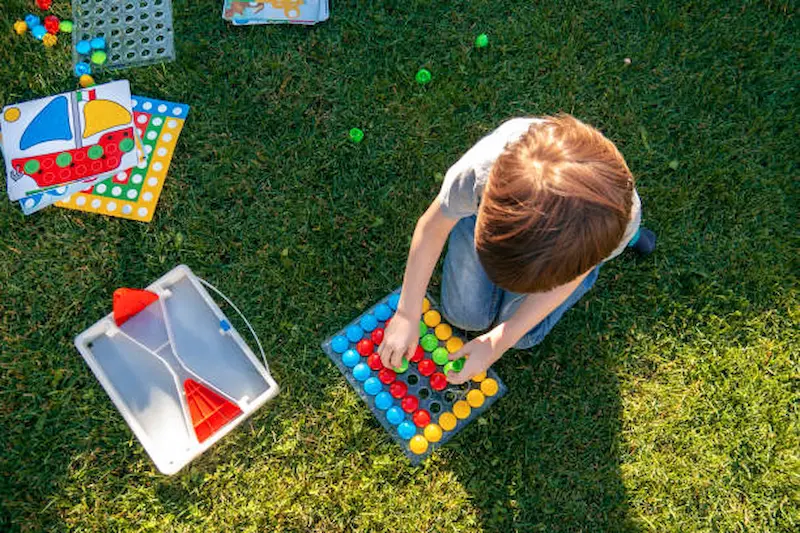Students in the fifth grade should learn about basic financial concepts like budgeting, saving money, and appreciating the worth of money. It attempts to teach youngsters important life skills so they can make wise financial decisions when they age older. It is essential because it instills strong financial habits, equips children with the knowledge they need to make wise choices, and helps create the foundation for their long-term financial success.
In this blog, we’ll talk about how important it is to give 5th graders financial literacy lessons so they may learn how to manage their money, make wise decisions, and lay a strong financial foundation for the future.
Table of contents
- Setting the Foundation
- Money Management Games
- Fun with Budgeting
- The Magic of Compounding
- Smart Shopping Habits
- Banking Basics
- Entrepreneurship Explained
- Investment Adventure
- Real Money Experiences
- Money Mistakes and How to Avoid Them
- Building a Financial Literacy Library
- Measuring Progress
- Conclusion
- Frequently Asked Questions ( FAQs )
Setting the Foundation

A. Understanding Money
Money serves several fundamental roles, providing valuable money lessons for kids. It acts as a medium of exchange, facilitating trade, and as a unit of account, allowing us to quantify value. Money also functions as a store of value, preserving wealth over time. Various forms of money, including traditional cash and digital currencies like Bitcoin, have unique characteristics and functions, making them essential components of our financial systems.
B. Importance of Saving
- Saving is necessary for monetary stability. It enables future investments, prevents debt accumulation, and acts as a safety net in difficult times.
- Setting financial goals encourages discipline and continuous saving. To ensure a stable financial future, set both short- and long-term goals, such as an emergency fund, retirement, or a dream vacation.
Money Management Games

A. Board Games
- Monopoly: Monopoly, a classic board game perfect for board games for kids, is an excellent tool for teaching financial strategy and property management. In the game, players engage in buying, trading, and developing properties, offering valuable insights into real estate transactions, negotiation skills, and risk management.
- The Game of Life: This board game simulates life choices, including career, family, and financial decisions. It educates players on the consequences of their choices, reinforcing the importance of planning and setting priorities.
B. Online Simulations
- Virtual Stock Market Games: Online games for kids provide a unique opportunity to practice investing in stocks without real financial risk. These interactive platforms are invaluable for developing a deeper understanding of market dynamics, risk tolerance, and effective investment strategies.
- Budgeting Apps: Mobile apps like Mint and YNAB offer hands-on budgeting experiences. They track expenses, set financial goals, and provide valuable insights into personal finance management.
Fun with Budgeting
A. Creating a Budget
- Income vs. Expenses: To begin budgeting, differentiate between your income sources and expenses. Understand where your money comes from and where it goes, enabling smarter financial decisions.
- Tracking Spending: Keeping tabs on daily expenditures helps identify areas for potential savings. Mobile apps like PocketGuard or spreadsheet tools simplify this process.
B. Budgeting Challenges
- Grocery Shopping Game: Transform grocery shopping into a budgeting game, especially beneficial for budgeting for kids. Set a spending limit and challenge yourself to find the best deals and discounts. This not only promotes mindful spending but also instills valuable money-saving habits, helping cut down on food costs.
- Allowance Management: Teach kids money management by giving them an allowance and encouraging them to budget for their wants and needs. This instills valuable financial skills from an early age.
The Magic of Compounding

Understanding compound interest is key to financial success and plays a pivotal role in financial literacy for kids. It’s the process where your money earns interest not only on the initial sum but also on the accumulated interest. Time is a significant factor, and the longer your money stays invested, the greater the compounding effect. To visualize this, use online compound interest calculators. By inputting your principal amount, interest rate, and time period, you can see firsthand how this magical force can significantly boost your savings and investments over time. It’s a powerful tool for building wealth and securing your financial future.
Smart Shopping Habits
A. Needs vs. Wants:
Distinguishing between needs and wants is fundamental for wise spending. Prioritize essential items like groceries and utilities over non-essential purchases, reducing unnecessary expenses.
B. Price Comparison Games
- Scavenger Hunt:
Turn shopping into a fun, educational game. Create a scavenger hunt for kids, asking them to find the best deals or discounts. It teaches them to be savvy shoppers and value-conscious consumers.
- Price Tracking:
Use apps or spreadsheets to monitor item prices over time. This helps you identify trends, score bargains, and make informed purchasing decisions, ensuring you get the most value for your money.
Banking Basics

A. Introduction to Banks:
Banks are central to the financial ecosystem, serving a critical role in providing a safe place for individuals, including bank accounts for kids, to store their money. Additionally, banks facilitate transactions and offer a wide array of financial products and services. These regulated institutions ensure the safety of deposits and contribute to the seamless operation of the economy.
B. Opening a Savings Account:
A savings account is a simple way to begin your banking journey. It provides a secure place to save funds while earning a tiny interest.
To open one, go to a nearby bank, complete the necessary papers, and put money down. Another advantage of online banking choices is convenience.
C. Understanding Interest Rates:
The amount that your money grows over time in a savings account depends on the interest rate. Banks offer interest on balances, which enables you to build up your savings. Comparing interest rates, comprehending compounding, and selecting an account that supports your financial objectives are essential.
Entrepreneurship Explained

A. What is Entrepreneurship?
The process of starting, running, and taking on the risks of a new firm or enterprise is known as entrepreneurship. To add value to the market entails seeing possibilities, gathering resources, and inventing. Entrepreneurs are people who have the drive, perseverance, and vision to realize their ideas.
B. Creating a Mini-Business
1. Idea Generation:
Start with brainstorming and identify a niche or problem you’re passionate about. Look for opportunities in the market and consider how your skills and interests can address them. An innovative idea is the cornerstone of entrepreneurship.
2. Cost and Profit Analysis:
Once you have an idea, calculate the potential costs and projected profits. Assess the financial feasibility of your venture by considering expenses like materials, labor, and marketing. A clear understanding of your cost structure and revenue potential is essential for a successful mini-business.
Remember, entrepreneurship involves risk, but with proper planning and execution, it can lead to fulfilling ventures and financial success.
Investment Adventure
Investment adventure is the exciting journey of growing your wealth through financial investments, an important aspect of learning money for kids. It includes stocks, bonds, real estate, and more. Understanding your risk tolerance and investment goals is crucial before embarking on this path. Diversifying your portfolio across different asset classes can help spread risk. Continuous learning about the market and various investment options is essential. With patience and a well-thought-out strategy, the investment adventure can lead to financial growth and security over time.
Real Money Experiences

Real-world possibilities to apply financial knowledge provide practical opportunities, especially for money management for kids. These endeavors, like stock investing, launching a small business or handling a household budget, impart useful lessons. They offer a venue for learning from both successes and failures, assisting people in acquiring useful financial skills that can result in long-term success and financial security. For financial objectives and personal finance mastery, these practical experiences are crucial.
Money Mistakes and How to Avoid Them
For a stable financial future, avoiding financial mistakes is crucial, especially in the context of finance for kids. Overspending, forgoing savings, and failing to have an emergency fund are all common faults. Spend sensibly and steer clear of high-interest debt, such as credit card debt. Consult with financial professionals, make a budget, and adhere to it. You can achieve financial stability and steer clear of long-term financial troubles by reflecting on these mistakes and taking proactive measures.
Building a Financial Literacy Library

Creating a financial literacy library is a powerful step toward personal financial empowerment and good habits for kids. Stock it with books for kids on budgeting, investing, and wealth-building. Accessible online resources and finance apps can complement your learning journey. A well-rounded financial literacy library equips you with the knowledge and tools to make informed decisions about money management, investing, and securing your financial future. It’s an essential resource for individuals striving to achieve financial success and independence.
Measuring Progress
Measuring progress is a vital component of any goal achievement, especially in the context of personal finance and good habits for kids. Tracking financial milestones and regularly reviewing your budget and investment performance helps gauge your financial well-being. It allows for adjustments, the celebration of successes, and the identification of areas that need improvement.
Tools like financial spreadsheets or apps can simplify this process. Regularly assessing your financial progress is essential for making informed decisions and staying on the path to financial stability and success.
Conclusion
Teaching financial literacy to 5th graders involves educating them on essential money management concepts, such as budgeting, saving, and responsible spending. The benefits are significant, as it empowers young learners to develop lifelong financial skills, make informed decisions, and cultivate a strong foundation for financial success and independence as they grow.
To get your hands on more educational and free resources on coding for kids, robotics for kids, financial education for kids, etc., do check out the BrightCHAMPS Page now!
To get your hands on more such articles, educational content, and free resources on coding for kids, robotics courses, game development, etc., check out the BrightCHAMPS Blog Page now!
Frequently Asked Questions ( FAQs )
A1. Engage students in financial learning with activities like budgeting games and mock savings accounts.
Q2. How can parents support financial education at home?
A2. Parents can support financial education at home by involving kids in budgeting, setting savings goals, and discussing money matters.
Q3. What are the long-term benefits of teaching financial literacy early?
A3. Teaching financial literacy early leads to lifelong benefits like responsible money management and financial security.
Q4. Are there any recommended books for teaching financial literacy to kids?
A4. Recommended books for teaching financial literacy to kids include “The Berenstain Bears’ Trouble with Money” and “A Chair for My Mother.”
Q5. How do I assess the effectiveness of financial education programs?
A5. Assess the effectiveness of financial education programs by monitoring children’s money habits, financial decisions, and understanding of key concepts.


 We are an army of educators and passionate learners from BrightChamps family, committed to providing free learning resources to kids, parents & students.
We are an army of educators and passionate learners from BrightChamps family, committed to providing free learning resources to kids, parents & students.








